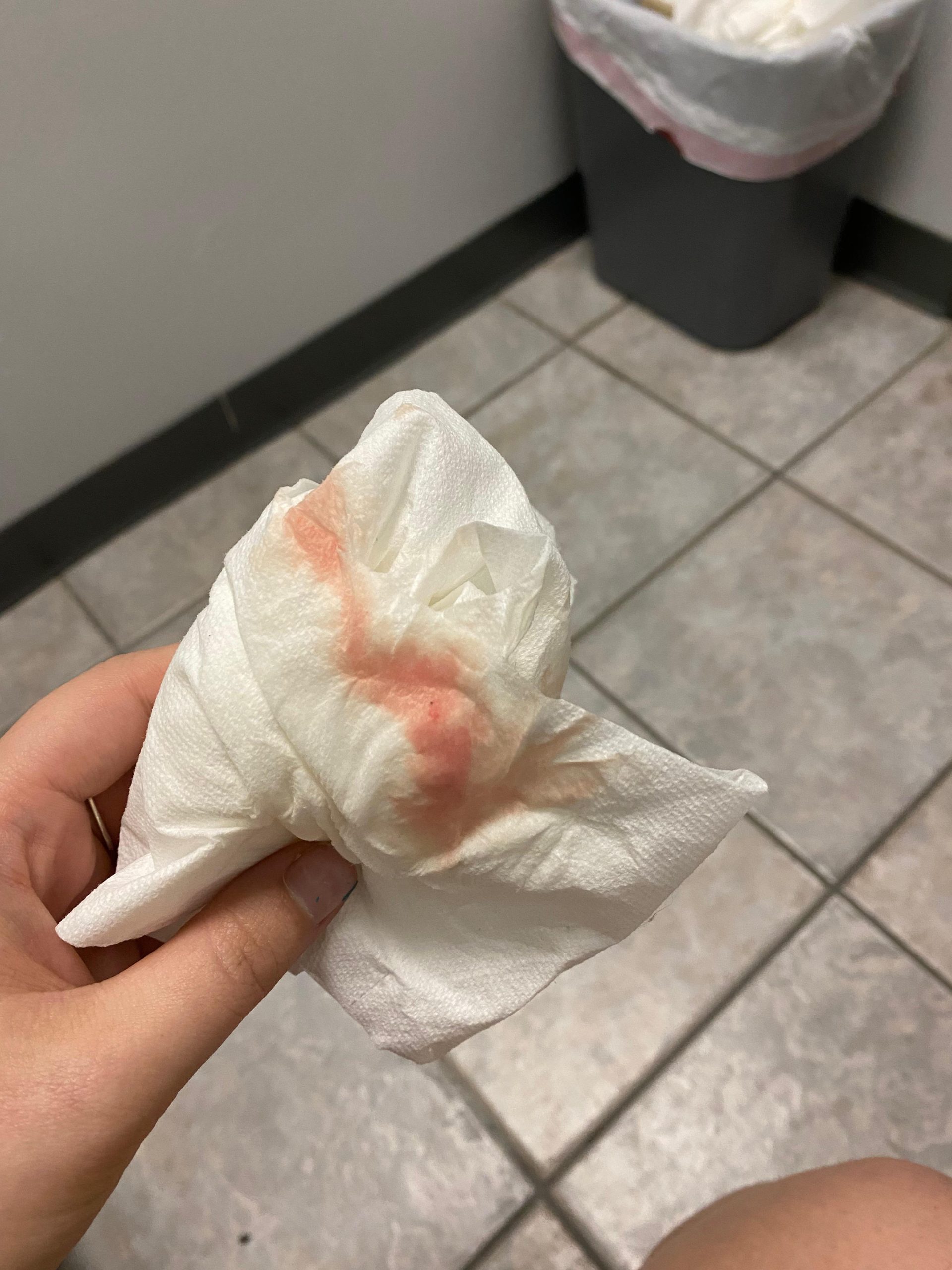Have you ever noticed a change in the consistency of your period blood? It’s not uncommon to wonder why your period blood is suddenly looking watery. As a seasoned menstruator, you’re familiar with the various colors and textures that can appear during your cycle. But when it comes to watery period blood, things can get a bit perplexing.

If you find yourself with watery period blood that seems out of the ordinary, it may raise some questions. In this blog post, we will see the mystery behind why your period blood may be taking on a watery consistency and what it could potentially signify.
Contents
Why Is My Period Blood Watery?
There are several reasons why your period blood might be watery, and most are not necessarily a cause for concern. Here’s a breakdown of some common explanations:
1. Low Hormone Levels
Low levels of hormones, especially estrogen, can significantly affect the thickness and volume of menstrual blood. Estrogen is crucial for regulating the menstrual cycle and maintaining the thickness of the uterine lining. When estrogen levels are low, the lining may be thinner, resulting in a more watery menstrual flow. This change can be due to various factors, including stress, excessive exercise, or certain health conditions.
2. Fast Flow
A quick menstrual flow might not have enough time to thicken or mix with the natural mucus and tissue inside the uterus, making it appear watery. This situation often occurs during the heaviest days of menstruation when the body is expelling blood and tissue at a faster rate. While this can be normal for some women, keeping track of your cycle and flow characteristics can help identify any significant changes.
3. Beginning or End of Period
At the start and end of your menstrual cycle, the flow is typically lighter, which can cause the blood to appear more diluted or watery. This is because the blood mixes with cervical mucus, leading to a thinner consistency. These changes are typically normal and reflect the natural variation in menstrual blood throughout the period.
4. Lifestyle and Diet Changes
Significant lifestyle changes, such as alterations in diet or exercise routines, can impact hormonal balance, potentially leading to watery period blood. For example, extreme dieting or intense exercise regimes can disrupt your body’s normal hormonal functions, affecting the menstrual cycle. Ensuring a balanced diet and moderate exercise can help maintain regular menstrual health.
5. Contraceptive Use
Hormonal contraceptives, including birth control pills, patches, rings, or intrauterine devices (IUDs), can influence menstrual flow and consistency. These contraceptives work by altering hormone levels to prevent pregnancy, which can sometimes lead to changes in the menstrual blood, making it appear lighter or more watery than usual.
6. Underlying Health Conditions
Certain health conditions, such as thyroid disorders, polycystic ovary syndrome (PCOS), or sexually transmitted infections (STIs), can affect the consistency of menstrual blood. These conditions can disrupt normal hormonal balances or cause inflammation, leading to changes in menstrual flow. Regular medical check-ups can help diagnose and manage these conditions.
7. Pregnancy
Light, watery bleeding may occur during the early stages of pregnancy, known as implantation bleeding. This type of bleeding is typically much lighter than a regular period and may be mistaken for a watery period. It occurs when the fertilized egg attaches to the lining of the uterus and is usually short-lived. If you suspect you might be pregnant, a pregnancy test and consultation with a healthcare provider are recommended.
Is A Watery Period A Sign Of Pregnancy?
Having watery period blood can be a cause for concern, especially if you’re questioning if it could indicate pregnancy. It’s crucial to understand the potential implications of this change and how it might relate to your reproductive health.

Implantation Bleeding: If you experience watery period blood, it’s essential to consider the possibility of implantation bleeding. This occurs when a fertilized egg attaches to the uterine lining, leading to light bleeding that may appear watery or pinkish.
Menstrual Changes: On the flip side, watery period blood could simply signify variations in your menstrual cycle. Hormonal fluctuations can impact the consistency and color of your menstrual flow, sometimes making it watery rather than the typical thicker texture.
Miscarriage Risk: In some cases, watery period blood could be a sign of a potential miscarriage, especially if accompanied by severe cramping or abdominal pain. If you suspect this is the case, it’s crucial to seek medical attention promptly.
Pregnancy Test: To rule out pregnancy as a potential cause of watery period blood, consider taking a pregnancy test. While this might not provide an immediate answer, it can help you determine if pregnancy is a factor to consider.
Is It A Watery Period, Or Implantation Bleeding?
Distinguishing between a watery period and implantation bleeding can be tricky, as both can share some similar characteristics. Here’s a breakdown to help you understand the key differences:

1. Timing:
Watery Period: Typically occurs around the expected time of your period, which is usually 11-14 days after ovulation.
Implantation Bleeding: Usually occurs 6-12 days after ovulation, which can be earlier than your expected period.
2. Flow:
Watery Period: Can be light or heavy, but the flow is usually consistent throughout your period.
Implantation Bleeding: Often described as spotting or very light bleeding, lasting only for a few hours or up to 3 days.
3. Color:
Watery Period: Can be bright red, dark red, or brown, depending on the day of your period.
Implantation Bleeding: Usually lighter in color, appearing pink, brown, or rust-colored.
4. Cramping:
Watery Period: May experience cramps before, during, or after your period.
Implantation Bleeding: Cramping is uncommon, but some women may experience mild cramping or twinges in the lower abdomen.
Can A Heavy Period Make You Pass Out?
Yes, a heavy period (menorrhagia) can lead to situations where you might feel faint or actually pass out, though this is generally due to secondary effects rather than the heavy bleeding itself. Here’s how it can happen:

1. Iron Deficiency Anemia
Heavy menstrual bleeding over time can lead to iron deficiency anemia, a condition where your blood doesn’t have enough red blood cells. These cells are responsible for carrying oxygen throughout your body. When you’re anemic, your organs don’t receive enough oxygen, which can lead to symptoms like fatigue, weakness, shortness of breath, and in severe cases, fainting.
2. Hypovolemia
In extreme cases, very heavy periods could lead to significant blood loss leading to hypovolemia (low blood volume). While rare, this condition can reduce the amount of blood available to circulate oxygen and nutrients to your brain and other vital organs, potentially causing you to feel lightheaded or faint.
3. Vasovagal Syncope
Some individuals might experience vasovagal syncope, a sudden drop in heart rate and blood pressure leading to fainting, often in response to stress or pain. For some women, the pain associated with heavy periods could trigger this response.
How To Deal With A Watery Period?
When experiencing watery period blood, it’s essential to understand how to manage this change. Here are some tips to help you deal with a watery period:

- Stay Hydrated: Drinking plenty of water can help maintain your hydration levels and may help regulate the consistency of your period blood.
- Monitor Your Flow: Keep track of how heavy or light your flow is and any changes in texture or color. This information can be valuable when discussing your symptoms with a healthcare provider.
- Healthy Diet: Consuming foods rich in iron and vitamins can support overall menstrual health. Incorporate leafy greens, lean proteins, and fruits into your diet.
- Talk to Your Doctor: If you consistently notice watery period blood or have concerns about your menstrual cycle, don’t hesitate to consult a healthcare professional. They can provide insight and guidance tailored to your specific needs.
- Consider Supplements: Your doctor may recommend iron supplements if you are experiencing significant changes in your period blood consistency. Always consult a healthcare provider before starting any new supplements.
- Practice Self-Care: During your period, prioritize self-care activities that help you feel more comfortable and relaxed. This can include gentle exercise, hot baths, or engaging in activities you enjoy.
Frequently Asked Questions
How can I manage a watery period effectively?
Staying hydrated, monitoring flow changes, eating a diet rich in iron and vitamins, consulting a healthcare provider if concerned, considering supplements under medical guidance, practicing self-care during menstruation, and recognizing the uniqueness of each individual’s menstrual cycle are essential for managing a watery period effectively.
Why is my period blood thin and slimy?
Cervical mucus mixing with menstrual blood can result in a jelly-like and slippery texture in your flow.
Is it normal to have a watery period?
Although heavy, watery period blood may feel normal for some, it should not be ignored as it can disrupt daily activities and may signify a larger health issue, according to The American College of Obstetricians and Gynecologists (ACOG).
What causes a very watery period?
Factors like starting hormonal birth control or having low estrogen levels can lead to experiencing a watery period.
What signifies healthy period blood?
Healthy period blood typically ranges from bright red to dark brown or black. Any orange or gray blood or discharge may indicate an infection. Pregnant women experiencing bleeding should consult a doctor or obstetrician for evaluation.
Why do I have watery blood in between periods?
Vaginal bleeding between periods could be due to infections in the vagina, cervix, or uterus. Some sexually transmitted infections like chlamydia or gonorrhea and yeast infections may also cause bleeding.
I am a medical student with experience and interest in Women’s health and well-being.